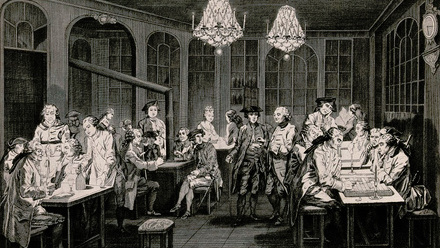Seven hallmarks of professionalism: summary report
Definitions of professionalism, key characteristics in the translation and interpreting industry, current challenges, and future directions.
Introduction
This report summarises the webinar discussion on the ‘Seven Hallmarks of Professionalism’ that we hosted on 20 March 2025. The report has been generated by AI (and lightly edited) from the video recording, the discussion in the chat file and the interactive white board used to collect participants' thoughts. The session was led by Sara Robertson (CEO) and explored definitions of professionalism, its key characteristics in the translation and interpreting industry, current challenges, and future directions.
Defining professionalism
As defined in the presentation materials, professionalism in translation and interpreting encompasses “the commitment to specialised linguistic and cultural expertise, ethical practice, and continuous development that enables translators and interpreters to facilitate cross-cultural communication while maintaining accuracy, confidentiality, and impartiality.”
Participants were asked to share their definitions of professionalism, which revealed several recurring themes:
- High standards: Many participants highlighted the importance of maintaining high quality standards and consistency in service delivery.
- Adherence to ethical guidelines: Following a code of conduct or professional practice was frequently mentioned.
- Reliability and responsibility: Meeting deadlines and taking ownership of one's work featured prominently.
- Accountability: Being answerable for the quality and accuracy of translation and interpreting..
- Competence and expertise: Possessing the necessary knowledge and skills to perform effectively.
- Ongoing development: Commitment to continuous professional development (CPD).
- Client-centred approach: Putting client interests first and adopting their perspective.
Seven hallmarks of professionalism
Sara Robertson presented seven key characteristics that she feels define professionalism:
- Holds specialist knowledge and expertise
- Holds formal qualifications or recognised credentials
- Adheres to a code of professional conduct
- Maintains and updates knowledge and skills
- Exercises independent judgment
- Places client/public interest above self-interest
- Takes responsibility for work
Discussion about the hallmarks
Participants generally agreed these hallmarks were comprehensive, though several additional aspects were suggested:
- Mentoring and knowledge transfer: Supporting less experienced professionals e.g. “Mentoring – passing on knowledge to less experienced entrants to the profession”
- Profession sustainability: Taking collective responsibility for the future of the profession e.g. “Caring for the sustainability of our profession”
- Responsible pricing: Avoiding undermining the profession through unsustainable rates e.g. “Not engaging in practices that undermine the viability of our trade, i.e. working at rates that are far too low to be sustainable in the long run”
- Ethical stance on technology: Using AI and other technologies responsibly, particularly regarding data confidentiality
Professional visibility and recognition
- A significant theme throughout the discussion was the ‘invisibility’ of translators and interpreters:
- Chris Durban noted, “I hear the invisibility trope all the time (Venuti’s concepts are largely navel-gazing seen from here). But how many translators rail about this but do not take action to step out into the spotlight?”
- Participants discussed the importance of ‘signing’ one’s work and receiving proper attribution, though opinions varied on when this is appropriate.
- Dana Szabados observed: “Sometimes, I see my work displayed in public places and I ask myself how many are aware somebody put the English meaning into Romanian, making sense culturally.”
- There was recognition that translators and interpreters must take active steps to increase their visibility, with Chris Durban suggesting getting profiles published “in a business publication — NOT a translator publication.”
- Several participants noted positive media portrayals of translators and interpreters are rare, citing examples like the film ‘The Interpreter’ and social media comments about Zelensky needing an interpreter at the recent White House meeting despite his good English skills.
Professionalism challenges
Participants identified several challenges to maintaining professionalism:
- Handling client feedback: Mirna Miljanovic asked how to “remain professional... when dealing with inaccurate feedback,” noting the need to “protect the accuracy and quality of our work.”
- Misconceptions about required skills: Many clients underestimate the expertise and knowledge needed.
- Technological disruption: Especially automated translation tools and AI.
- Undervaluation: Clients who “neither know or care about our CPD – they don’t know what they don’t know” (Sue Leschen).
- Confidence issues: Chris Durban noted that ‘imposter syndrome’ can be overcome by learning “what you need to know to feel confident.”
The future of professionalism
Participants offered thoughtful perspectives on how professionalism might evolve:
- AI integration: Many comments focused on responsible approaches to using AI in translation and interpreting workflows.
- Revaluation after disruption: “After a dip in the valuation of professional translation, we will experience a re-evaluation of the importance of human translation.”
- Shift to consultancy roles: Several participants suggested translators will increasingly become “language and inter-linguistics communication consultants” valued for their “cultural capital as much as their linguistic wizardry” (Anna Wright).
- Specialisation emphasis: Chris Durban predicted a “sharper distinction between genuine subject-matter experts and ‘generalists.’”
- Boutique services: Some participants foresaw translation becoming “more valued, as a boutique service.”
- Career fluidity: “People will stop seeing themselves as being bound to one profession for a lifetime – there will be much more mobility between them.”
Conclusion
The discussion revealed that while the core hallmarks of professionalism remain consistent, the application of these principles is evolving in response to technological change, market pressures, and client expectations. Participants demonstrated a strong commitment to maintaining high professional standards while recognising the need to adapt and advocate for the value of their expertise.
The conversation highlighted how ITI membership, networks, and qualifications play an important role in supporting professional development, providing a community of practice, and maintaining standards within the industry.





